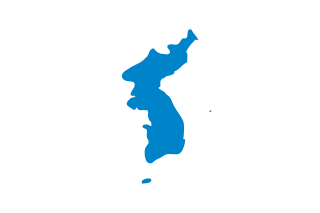| Myung-sook | |
| Hangul | 명숙 |
|---|---|
| Hanja | 明 淑 and others |
| Revised Romanization | Myeong-suk |
| McCune–Reischauer | Myŏngsuk |
Myung-sook, also spelled Myeong-sook or Myong-suk, is a Korean feminine given name. Its meaning differs based on the hanja used to write each syllable of the name. There are 19 hanja with the reading "myung" and 13 hanja with the reading "sook" on the South Korean government's official list of hanja which may be registered for use in given names. [1] Myung-sook was the fifth-most popular name for newborn girls in South Korea in 1950. [2]

Korea is a region in East Asia. Since 1948, it has been divided between two distinct sovereign states: North Korea and South Korea. Korea consists of the Korean Peninsula, Jeju Island, and several minor islands near the peninsula. Korea is bordered by China to the northwest, Russia to the northeast, and neighbours Japan to the east by the Korea Strait and the Sea of Japan.

Hanja is the Korean name for Chinese characters. More specifically, it refers to those Chinese characters borrowed from Chinese and incorporated into the Korean language with Korean pronunciation. Hanja-mal or Hanja-eo refers to words that can be written with Hanja, and hanmun refers to Classical Chinese writing, although "Hanja" is sometimes used loosely to encompass these other concepts. Because Hanja never underwent major reform, they are almost entirely identical to traditional Chinese and kyūjitai characters, though the stroke orders for some characters are slightly different. For example, the characters 教 and 研 are written as 敎 and 硏. Only a small number of Hanja characters are modified or unique to Korean. By contrast, many of the Chinese characters currently in use in Japan and Mainland China have been simplified, and contain fewer strokes than the corresponding Hanja characters.
Myung, also spelled Myeong, Myong, or Myoung, is a Korean family name, a single-syllable Korean given name, and an element in some two-syllable Korean given names. Its meaning differs based on the hanja used to write it.
People with this name include:
- Han Myeong-sook (born 1944), South Korea's first female prime minister
- Kim Myong-suk (born 1947), North Korean volleyball player
- Paek Myong-suk (born 1954), North Korean volleyball player
- Kimshin Myongsuk (born 1961), South Korean feminist activist
- Jong Myong-suk (born 1993), North Korean wrestler

Han Myeong-sook was the Prime Minister of South Korea from April 2006 to March 2007. She is South Korea's first female prime minister. She was from the United New Democratic Party (UNDP) as a member of the Korean National Assembly (representative) for Ilsan-gab, and is a graduate of Ewha Womans University in Seoul with a degree in French literature. She resigned as Prime Minister on March 7, 2007 and declared her presidential candidacy. But she did not succeed in the nominations. In 2008 she ran for parliament, but was not elected. However, in January 2012 she was elected leader of the main oppositional Democratic United Party (DUP) before the April legislative elections and became a member of parliament. But the liberals did not manage to defeat the ruling Saenuri Party and Han stepped down as party leader in April 2012. In August 2015, Han was convicted of receiving illegal donations at the amount of 900 million KRW, and sentence to two years in prison. She is ineligible to run for public office for ten years after her prison term. She became the first former prime minister of the Republic of Korea to serve a prison time.
Kim Myong-suk is a female North Korean former volleyball player who competed in the 1972 Summer Olympics.
Paek Myong-suk is a female North Korean former volleyball player who competed in the 1972 Summer Olympics.
Fictional characters with this name include:
- Myung-sook, character portrayed by Bang Eun-hee in 2004–2005 South Korean television series Precious Family
Bang Eun-hee is a South Korean actress. Bang made her acting debut in 1988, and rose to fame after being cast as the lead actress in Im Kwon-taek's General's Son (1990). She has starred in films and television dramas such as The Day a Pig Fell into the Well (1996), No. 3 (1997), 3PM Paradise Bath House (1997), Shadows of an Old Love (1998), Legend of Hyang Dan (2007), Daebak Life (2008), and All My Love (2010).
Precious Family is a South Korean television series starring Kim Hee-ae, Heo Joon-ho, Song Jae-ho, Kim Hae-sook, Jang Hyun-sung, Lee Dong-wook, and Lee Yoo-ri. It aired on KBS2 from October 16, 2004 to July 5, 2005 on Saturdays and Sundays at 19:55 for 68 episodes.